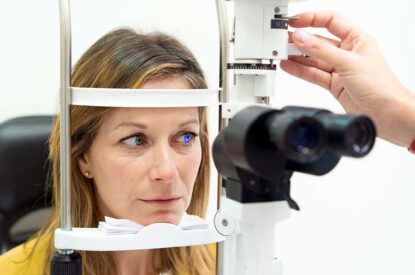Normal-Tension Glaucoma
What Is Normal-Tension Glaucoma?
In normal-tension glaucoma, the optic nerve gets damaged even though the eye pressure is within a normal range.
Also called low-tension or normal-pressure glaucoma, normal-tension glaucoma (NTG) is a condition in which the optic nerve is damaged without eye pressure exceeding the average range (usually between 10-21mm Hg). There is debate among glaucoma experts whether NTG is a separate entity from primary open angle glaucoma (POAG) or just another form of POAG.
How Is Normal-Tension Glaucoma Different?
Whether or not NTG is a separate entity from POAG, there are a few features that appear to be more common in NTG than in POAG. Patients with NTG tend to have visual field abnormalities closer to the center of vision. Also, hemorrhages in the small blood vessels of the optic nerve tend to be more common in patients with NTG. NTG has been associated with migraines and low blood pressure.
What Causes Normal-Tension Glaucoma?
It is believed that factors not related to eye pressure may play a larger role in NTG than in POAG. These factors include abnormalities in the blood flow to the optic nerve, and structural weakness of the optic nerve tissue. Researchers continue to examine why some optic nerves are damaged by relatively low eye pressure levels.
How Is Normal-Tension Glaucoma Diagnosed?
NTG is diagnosed using the same tests as those used for POAG. In addition, your doctor may obtain several eye pressure measurements at different times of the day to be sure that the eye pressure is within the average range. In some cases, if the optic nerve appearance is not typical for glaucoma, your doctor may recommend imaging of the brain and the optic nerve to rule out other causes of optic nerve damage.
How Is Normal-Tension Glaucoma Treated?
Normal-tension glaucoma is treated in the same way as POAG by reducing the eye pressure using medications, laser treatment, and surgery. Blood flow to the optic nerve may play an important role in NTG but currently there is no treatment that can directly modify it. If high blood pressure is over-treated with medications, the optic nerve blood flow may be affected. Your eye doctor may suggest a discussion with your primary care doctor about adjusting your medications to maintain an optimal blood pressure.
Learn More



